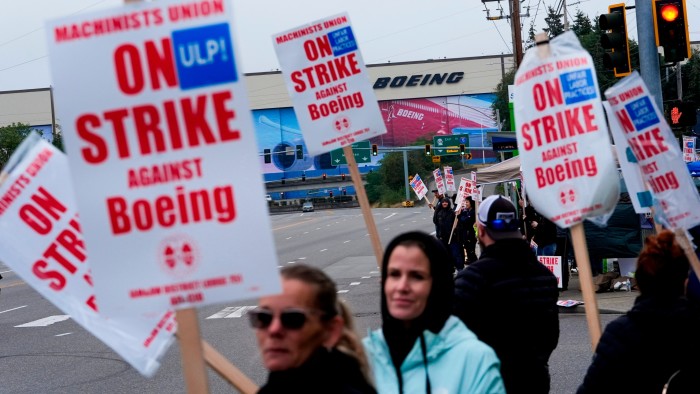Unlock the Editor’s Digest for free
Roula Khalaf, Editor of the FT, selects her favourite stories in this weekly newsletter.
Boeing said it would report a much bigger fourth-quarter loss than Wall Street anticipated as it took $2.8bn in charges stemming from a six-week-long strike, higher costs in its defence business and cuts to its workforce.
The plane maker said it lost $5.46 per share between October and December while revenue was $15.2bn. It also burnt through $3.5bn in cash, according to a preliminary filing. Wall Street analysts expected a loss of $1.55 per share and $16.6bn in revenue, according to FactSet data.
Boeing is scheduled to report full-year earnings next week. Shares closed at $178.50 on Thursday but fell more than 2 per cent in after-hours trading.
Chief executive Kelly Ortberg said that while Boeing faced “near-term challenges, we took important steps to stabilise our business during the quarter”, reaching a deal with the International Association of Machinists District 751 and raising more than $24bn in equity to bolster its balance sheet.
“Our team remains focused on the hard work ahead to build a new future for Boeing,” he said.
Ortberg has been trying to turn the manufacturer around since he took the helm in August. Boeing has struggled since a design flaw caused two fatal crashes, leading to a worldwide grounding of its 737 Max fleet. Then last year a mid-air door panel blowout on a commercial jet forced the company to slow production as it sought to improve manufacturing processes and deal with heightened scrutiny by regulators, legislators and the flying public.
Machinists brought production to a standstill at Boeing’s factories around Seattle in the autumn, which the company said resulted in lower deliveries and a pre-tax earnings charge of $1.1bn on the 777X and 767 programmes. The business reported a negative profit margin of 43.9 per cent on $4.8bn in revenue.
The defence business took a $1.7bn charge spread across five programmes: the KC-46A tanker, T-7A trainer jet, MQ-25 drone, the commercial crew space capsule and its low-volume, high-prestige project, Air Force One. The unit also reported a negative profit margin, of 41.9 per cent on $5.4bn in revenue.


